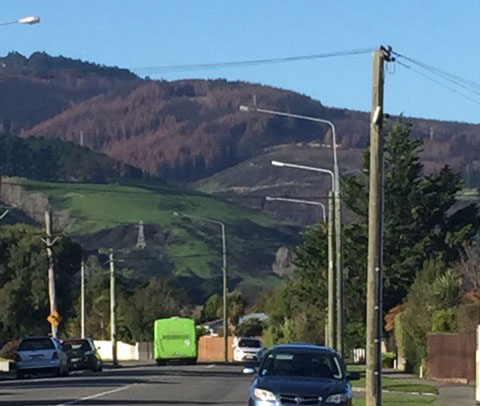As we drove out of the cordon, we looked back and saw the fires, on both sides of the suburb, making their way down the hills towards us. It was easy in the dark to see each tree or bush being consumed individually as the fire moved on. The street was lined with others doing the same - watching and waiting and speechless. It was easy also to give in to the fear that was building inside me, burgeoning out just like the flames, with no helicopters to fight it. I went back to Sarina’s house with adrenalin coursing through me, smiled robotically at the kids, “no, we left the cat, she’ll be fine”, and climbed into bed not even wanting to sleep.
My adrenalin-fuelled brain was functioning fine on the practical level - everyone had warm covers, drinks, went to the toilet, bags were stowed, children were encouraged to be polite and courteous to our hosts, their feelings were acknowledged but not reinforced, media was turned off and cuddles given; But I couldn’t think wider or deeper than that, small things bothered me, I couldn’t reflect on my actions, my emotions seemed deadened (except for fear!) it was like I was detached from myself, like my vision had narrowed and all I could cope with was what was in front of me. I’ve had this experience before when trauma has been around, looking at the world as though it was behind a screen and I was a passive though anxious observer.
This is of course, anxiety at work in my brain. You would think I would know what to do about that to reduce its effects. I did at least recognise it, I knew I was stuck behind that wall. And I did the things I needed to do to look after us - made things easier for us by agreeing to kids wishes instead of fighting them, spending money on food instead of cooking, and I found us a supportive place to be where we could be distracted by other things; I also reduced my time and their time on media watching the footage, but it was hard to resist looking out the window at the smoke and the flames. Luckily, there was a curtain to draw.
I thought it would be interesting to hear the kids’ reflections on my behaviour that night, so I asked them;…my 10 year old said “I was scared, really scared, but you said “everything is going to be all right” and that reassured me. If you hadn’t said that and acted like it was okay, I would have been even more scared.” My older girl said, “you looked worried and you acted like something serious was happening, but you weren’t panicked. So I took you seriously when you said to do things like get our stuff, but I think you got it about right, it was about the right amount of worry”.
These are the things I learned (again) about anxiety that night
-If I focus on it, I feed it, just like those flames.
-Even though it feels weirdly like we are ignoring the elephant in the room, talking about something else for a while gives some relief.
-If I look at myself in the mirror and speak to myself, it grounds me, I can get out of what is going on in my head.
-The more anxious I am, the more anxious my kids are, I can see them wind up, fight with each other and become fragile.
Looking at those green shoots I think about what it is that sustains us. For me, it is hope. Always hoping that it will be better, and usually it is - there have been times it hasn’t been, but usually hope wins. For Christchurch with trauma after trauma it is difficult to hold onto hope, we don’t want to trick ourselves and be let down again. Those green shoots luckily don’t take long to grow up, they are much quicker than consents to process and they bring hope with them.
Julie Burgess-Manning PGDip PP, MSc (FamTher), PG CertED, BA Hons (Psych)
Julie Burgess-Manning is a Family Therapist and NZ Registered Psychologist who has studied and practiced in England and throughout New Zealand. She has worked in a variety of child, adolescent and family mental health settings for the past 18 years, with roles such as Senior Clinician, Therapist, Clinical Supervisor and Primary Mental Healthcare Liaison.

 RSS Feed
RSS Feed